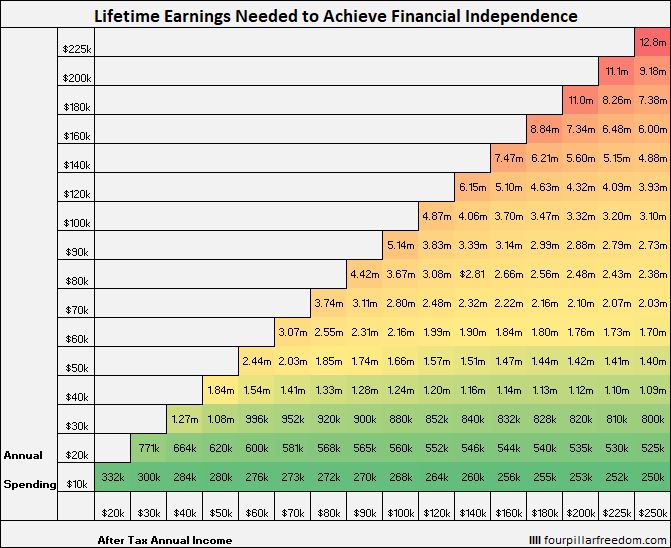
4 min read
THIS POST MAY CONTAIN AFFILIATE LINKS. PLEASE READ MY DISCLOSURE FOR MORE INFO.
Suppose William wants a watch that costs $20,000. He works hard for a year at his day job, diligently saves a portion of each paycheck, and eventually saves the $20,000 he needs to buy the watch. He goes to the jeweler, purchases the watch, and satisfies his desire. He is now content.
Suppose his friend Carl doesn’t want a watch at all. He simply has no desire for one. And since he has no desire for one, he doesn’t have to spend any time or energy saving $20,000 to buy one. Even without the watch, Carl is content.
Both men are equally content, the only difference being that William had to spend time, energy, and money to buy something that allowed him to be as content as Carl.
This brings up an important point: not wanting something is as good as having it.
Money Represents Life Energy
Vicki Robins, author of Your Money or Your Life, once said in an interview:
“When you understand money as YOUR life energy, the hours of your life you invest to put dollars in your wallet, you translate it into something knowable… and limited: the hours of your life. This transforms spending because you see everything from a cup of coffee to a new car in terms of does this merit the hours of my life invested to get it rather than I want it, I deserve it, everyone else has one, expense be damned i’ll put it on my credit card.”
We all have a limited amount of hours in our lives. Often we have to exchange hours and effort (our life energy) for money to pay for things. Vicki says when you realize that money represents life energy, you begin to question whether certain purchases merit the life energy you have to invest to pay for them.
Some purchases are necessary and improve our lives: housing, transportation, food, water, electricity, etc. But other purchases are unnecessary, frivolous, and bring very little (if any) lasting satisfaction. It’s these frivolous purchases that we should seek to cut out since they require us to pay our life energy for things that bring us no lasting satisfaction in return.
What We All Seek: Peace
What we’re all after isn’t stuff, it’s the feeling that we think that stuff will give us: contentment, satisfaction, and tranquility. We all just want to feel at peace. And the less stuff we need to own to feel at peace, the less time we have to spend in a cubicle doing work we find pointless.
As I shared in the Lifetime Earnings Grid, the amount you need to earn over the course of your lifetime to achieve financial independence is dependent on how much you spend each year:

A household that earns $100k after tax each year and spends $90k each year will need to earn over $5 million to achieve F.I.
By contrast, a household that earns $100k after tax each year and only spends $50k each year will need to earn just $1.66 million over their lifetime to achieve F.I.
By reducing annual spending, a household needs to earn far less income during their lifetime and spend far less time at a job they may or may not enjoy, to gain freedom.
How to Find Peace With Less
The most straightforward way to find peace is not through buying all the things you desire, but through simply limiting your desires in the first place.
In A Guide to the Good Life, William B. Irvine shares:
“A much better, albeit less obvious way to gain satisfaction is not by working to satisfy our desires but by working to master them. In particular, we need to take steps to slow down the desire-formation process within us. Rather than working to fulfill whatever desires we find in our head, we need to work at preventing certain desires from forming and eliminating many of the desires that have formed. And rather than wanting new things, we need to work at wanting the things we already have.”
Irvine goes on to say,
“We need to take steps to prevent ourselves from taking for granted, once we get them, the things we worked so hard to get.”
The way to find inner peace is to want the things you already have. At one point in time, the house you currently live in may have been your dream house. Your spouse may have been your dream spouse. Your car may have been your dream car. Over time, these things may have become normal to you, and you may now take them for granted.
To avoid taking them for granted, remember back to the time when you wanted them so badly. Be grateful that you have them now.
Conclusion
As Grant from Millennial Money once wrote, success isn’t about money, it’s about peace. It doesn’t matter if you live in a 5,000 sq. foot home or a 300 sq. ft. home, if you’re at peace, you’re successful.
You can spend your life energy pursuing things you think will bring you peace, or you can simply bypass the things altogether and find peace by:
- Learning to master your desires, rather than satisfy them
- Learning to desire the things you already have
- Avoiding taking things for granted (your spouse, family, health, house, etc.)
- Recognizing that material possessions bring fleeting, not lasting, satisfaction
- Recognizing that not wanting something is as good as having it
- Using your money to buy your time, not more stuff
The choice is yours.
You can find my complete book notes on A Guide to the Good Life here.
- The Ad Revenue Grid - August 6, 2021
- Attract Money by Creating Value for a Specific Audience - July 13, 2021
- The 5-Hour Workday - March 26, 2021
Full Disclosure: Nothing on this site should ever be considered to be advice, research or an invitation to buy or sell any securities, please see my Terms & Conditions page for a full disclaimer.

Zach…great post! I have been following you for quite a long time…this “appreciating what you have” is your best! Thanks, Kate
Thanks, Kate! Glad you enjoyed this post 🙂
Incredible Post Zach. This is beautiful and something I needed to read.
Thanks Ernesto! Glad you found value in this post 🙂
Good post. In a very disposable society, it’s easy to buy stuff and then toss it when the mood strikes. However, for us folks who make informed purchases, we get quality and plan on keeping our stuff a long time. I like the lyrics in Sheryl Crow’s song “….It’s not having what you want. It’s wanting what you’ve got..”
I also like the idea of giving things a value in terms of our time. How many hours do I have to work to afford that? Is it worth it? Ok, so that lovely handbag costs me 6 hours worth of work at my job. Could I live with what I have or swap/trade for it instead? Ya know, that kind of thinking puts things in a better perspective.
Love that line – “It’s not having what you want. It’s wanting what you’ve got.”
Love this post man, such a great way to think about this!
Thanks Matt! Glad this post resonated with you.